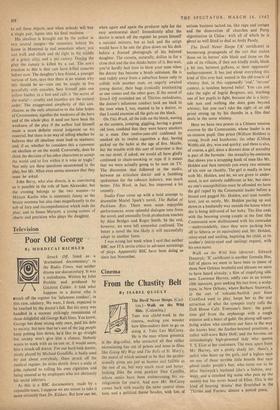Cinema
From the Chastity Belt
By ISABEL QUICLY
The Devil Never Sleeps. (Carl- ton.)—Walk on the Wild Side. (Columbia.) THIS was cliché-week in the cinema, making you wonder how film-makers dare to go on doing it. Take Leo McCarey. He is the man whose gimmick is the dog-collar, who extracted all that rather excruciating fun out of priests and nuns in films like Going My Way and The Bells of St. Mary's, the moral of which seemed to be that the profes- sionally pious are just as human and fallible as the rest of us, but very much nicer and better- looking (like the even pawkier Don Camillo, whose antics have been embarrassing his co- religionists for years). And now Mr. McCarey comes back with exactly the same central situa- tion, and a political theme besides, with lots of serious business tacked on, like rape and torture and the desecration of churches and Party organisation in China: with all of which he is about as well fitted to deal as Andy Pandy.
The Devil Never Sleeps ('A' certificate) is boomerang propaganda of the sort that makes those on its heroes' side blush and those on the side of its villains, if they are kindly souls, blush a bit too, between guffaws, at their opponents' embarrassment. It has just about everything this kind of film ever had, soused in the old treacle of whimsy that, in this supposedly 'real,' serious' context, is tasteless beyond belief. You can just take the sight of Ingrid Bergman. say. teaching one of her pupils to fight, because she is a fairy- tale nun and nothing she does goes beyond whimsy; but you can't take the sight of an old priest strung up by his thumbs in a film that deals in the same whimsy.
Here we have two priests in a Chinese mission overrun by the Communists, whose leader is an ex-mission pupil. One priest (William Holden) is young, brash and handsome; the other (Clifton Webb) old, dry, wise and quirky; and there is also, of course, a girl, since a discreet dose of sexuality is part of the formula: the sexuality-by-omission that shows you a strapping hunk of man like Mr. Holden and then reminds you every two minutes of his vow on chastity. The girl is madly in love with Mr. Holden, and he, we are given to under- stand, is not entirely indifferent to her, but since no one's susceptibilities must be offended we have the girl raped by the Communist leader before a bound and gagged Mr. Holden, and nine months later, just as surely, Mr. Holden pacing up and down in a husbandly way outside the house where she is being delivered of her baby. The film ends with the beaming young couple at the font (the Communist now disillusioned with his comrades —understandably, since they were packing him off to Siberia or its equivalent) and, Mr. Holden, misty-eyed and smiling, baptising the child, at its mother's (misty-eyed and smiling) request, with his own name.
Walk on the Wild Side (director : Edward Dmytryk; 'X' certificate) is another formula film, full of places we seem to have been to (most of them New Orleans brothels) and phrases we seem to have heard already; a film of stupefying silli- ness. Lawrence Harvey, oddly cast as an irresis- tible innocent, goes seeking his lost love, a sculp- tress, in New Orleans, where Barbara Stanwyck, in the sort of volcanic-basilisk part Joan Crawford used to play, keeps her as the star attraction of what the synopsis coyly calls the Doll House Café. Everyone's there : the good- time girl from the orphanage with a tough exterior and a heart of gold; the plump self-sacri- ficing widow who comforts our hero in the way she knows best; the feather-brained prostitute, a rather well-worn Baby Doll; and the heroine, an intimidatingly high-powered lady who quotes T. S. Eliot at her customers. The men, apart from Mr. Harvey, are a pretty shady lot : there's a sadist who beats up the girls, and a legless man on one of those terrible little boards that race about under people's feet, who turns out to be Miss Stanwyck's husband (she's a lesbian, any- way), and a crooked big noise who puts up the money but has never heard of Eliot. This is the kind of heaving 'drama' that flourished in the Thirties and Forties; almost a period piece,


































 Previous page
Previous page